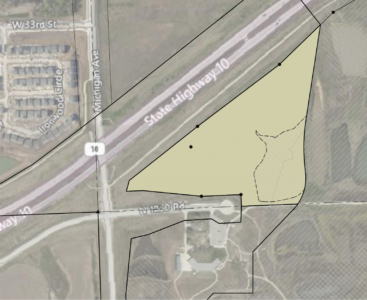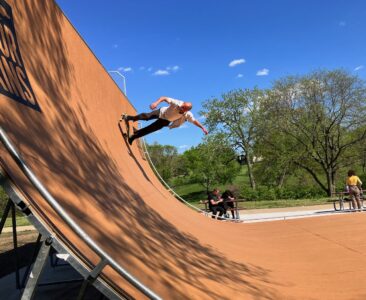Health department director shares updates on health officer replacement, county’s recent COVID surge, vaccination rates and more

photo by: Contributed and Journal-World File Photos
Lawrence-Douglas County Public Health Director Dan Partridge is pictured along with the department's home in the Community Health Facility, 200 Maine St.
The process of selecting a new health officer for Douglas County is still underway, but the goal is to have a recommendation for a replacement next month.
Lawrence-Douglas County Health Department Director Dan Partridge spoke with the Journal-World this week about replacing outgoing Health Officer Dr. Thomas Marcellino and about other topics related to the coronavirus pandemic.
In addition to Marcellino’s resignation, this month has seen a renewed mask mandate in the county amid a record surge in COVID-19 cases that has put a strain on local health care resources.
Partridge said the process of selecting Marcellino’s successor was ongoing, but he hoped to have a recommendation for the Lawrence-Douglas County Health Board to approve at its February meeting. Partridge shared at the board’s Jan. 18 meeting that Marcellino planned to resign.
Since that meeting, Partridge said he has spoken with both Marcellino and Deputy Health Officer Jennifer Schrimsher, whom he floated at the time as a potential option to take over Marcellino’s duties. That could potentially look like Schrimsher moving into the health officer role and Marcellino’s title shifting to medical consultant, Partridge said.
It would be valuable to keep them both on board in that capacity, Partridge said, because of their familiarity with Douglas County’s response to the coronavirus pandemic.
“Just the history of having participated in Unified Command for over a year now — well, really, since the very beginning — it’s hard to replace that,” Partridge said.
On the topic of the federal distribution of at-home COVID-19 test kits and N95 masks, Partridge said those initiatives come with their own share of problems.
As far as mask distribution is concerned, Partridge said he doesn’t have an answer right now regarding how mask distribution might look locally and hasn’t received any federal directive for what the county should be doing.
However, he said he didn’t expect it to be the smoothest of processes.
“I would anticipate that’s probably not something that is well-coordinated with local health departments,” Partridge said. “Each branch of government usually does things autonomously. I’m not criticizing it; it’s just the way it is.”
Partridge said he’s actually more concerned about some challenges that could arise from distribution of the rapid test kits. For one, he said that the tests shipping straight to a home — four tests per household — would put the onus on a community member to report a positive COVID-19 case to the county’s health department or the state, which could cause that data to “fly under the radar.”
That makes it especially important for community members to “do the right thing” and report their positive tests, Partridge said.
As for equity issues with federally distributed test kits, such as whether there may be a lack of equal access for multifamily homes or people without an individual address, Partridge said the county has local ways of addressing those issues.
He pointed to a partnership the health department has had with the University of Kansas, helped by the National Institutes of Health’s RADx grants. For more than a year, KU has provided tests and some funding to help with the health department’s outreach to historically marginalized groups and at-risk members of the community.
That supply of tests ran out about two or three weeks ago, he said, but an order is “in the queue,” and those tests will be sent out “through an equity lens” once they arrive in Douglas County. Those grant funds run out in June.
Partridge said the health department also hoped to engage in an outreach campaign.
“In fact, we’re working with the City of Lawrence to leverage some community development block grant monies to actually go out to neighborhoods and locations and get a little closer to where the need might be. That’s still a plan that’s being put together, and we’ve got to hire staff to do that. We’re a long way from seeing that on the street, but we’re trying to get there.”
Regarding the recent surge in COVID-19 cases locally, Partridge said it has been encouraging to see that community members are generally complying with the mask order that went into effect Jan. 7 and was later extended to Feb. 9.
“This is really about reducing risk, so the more people that wear a mask, the more we reduce the risk,” Partridge said. “From that sense, it is working. Now, is it perfect? Did we eliminate risk? No. We haven’t, and we won’t. That’s why you need to get vaccinated. … There’s a series of things you can do and if you do all of them, your risk is going to be less than if you do one or none of them. That’s really what we’ve been trying to say to the community.”
You can’t necessarily track a mask mandate’s efficacy from a data standpoint, Partridge said, but recent data does indicate that Douglas County has the second lowest number of COVID-19 cases based on population in the state. That, he said, points to the community doing a good job of lessening the risk of spreading COVID-19.
Whether that mask mandate will be extended again is still unclear, Partridge said, but he did note that data seems to suggest that we are at the start of a downturn from the most recent case surge caused by the omicron variant.
“I think it’s important that we’re taking a wait-and-see approach,” Partridge said. “To me, it’s an indication that we’re not just throwing on a Band-Aid for other reasons. We’re purely driven by how we reduce the spread of this disease.”
The end to the recent surge may well be on the horizon, though not without another couple of weeks of likely higher numbers of new COVID-19 cases than pre-omicron, Partridge said. Nevertheless, there is room for optimism.
“I hope that we’ll put the days of 300 (new cases) a day behind us,” Partridge said. “I kind of have some optimism that that’s the case.”
Along with that optimism comes an opportunity for the health department to shift some of its focus toward its typical endeavors, like this year’s Community Health Assessment. The health department is preparing to launch a “heavy lift” in that area this year, with hopes of learning more directly from community members what matters most to them regarding public health.
According to the health department’s most recent data, 63.6% of eligible Douglas County residents are fully vaccinated, and a little more than half of that group has received a booster shot. However, Partridge said first-time vaccinations have leveled off to about 300 to 600 administered per week, leaving tens of thousands of community members unvaccinated.
That means that at this rate there’s a “long way to go,” he said, especially when accounting for factors out of the health department’s control like new residents moving to Douglas County who aren’t represented in its data.
One good sign, though, is the county’s rate of children ages 5 to 12 who have been vaccinated. Nationally, that number was just 17%, according to data from earlier this month. But here in Douglas County, Partridge said the health department estimates the rate for that same age group will hit 50% by the end of January.
“We’ve kind of gone through enough cycles of high demand, low demand, high supply, low supply that any of those combinations, we’ve seen in the past,” Partridge said. “Right now, it’s more low demand and high supply of vaccine, but if that flips, we can respond to that. We’d love to see that demand spike, and I wish I knew what that magic bullet would be to get demand to go up.”
It will likely take community examples to raise vaccination figures further, Partridge said — leadership from peers who encourage their neighbors to do their part.








COMMENTS